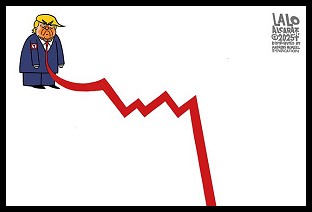 Please get it straight: the concern is about "polling place Photo ID restrictions" not "Voter ID".
Please get it straight: the concern is about "polling place Photo ID restrictions" not "Voter ID".
I've tried to warn progressives about this for years, to little avail, but discussing concerns about "Voter ID" is akin (pun intended?) to talking about "Legitimate Rape".
After all, everyone is against "legitimate rape"! But using that phrase, as most instinctively seem to understand, allows for the misleading subconscious notion idea that there is some other kind of rape that is less "legitimate".
In the same way, "Voter ID" is quite reasonable sounding --- after all, who could be against the reasonable sounding idea of identifying oneself before voting? --- but Republican-enacted polling place Photo ID restrictions are a different matter all together. Republicans know that very well, even if Democrats still can't seem to get it.
Both phrases, "Legitimate Rape" and "Voter ID", each reasonable sounding enough, miss the point and are tremendously misleading. Republican vote suppressors know that, so they love it when Democrats and progressives and voting rights advocates use the phrase "Voter ID" instead of "polling place Photo ID restrictions."
The fact is, the majority of states already require some form of reasonable identification of voters before voting, at least at the polling place. For that matter, federal law --- the Help America Vote Act (HAVA) of 2002 --- already requires "Voter ID" in all 50 states when voting for the first time at the polling place, if the voter did not register in person and present ID at that time...


 Trump EPA Guts Enviro Justice Office: 'BradCast' 4/24/25
Trump EPA Guts Enviro Justice Office: 'BradCast' 4/24/25 'Green News Report' 4/24/25
'Green News Report' 4/24/25
 Nation's Largest Broadcaster Mandates News Outlets Hoax Viewers to Help Gut FCC Rules: 'BradCast' 4/23/25
Nation's Largest Broadcaster Mandates News Outlets Hoax Viewers to Help Gut FCC Rules: 'BradCast' 4/23/25 Trump's FCC on Precipice of Ending All Limits on Corporate Control of Local TV Stations
Trump's FCC on Precipice of Ending All Limits on Corporate Control of Local TV Stations GOP Earth Day 2025 Hypocrisies and Dilemmas: 'BradCast' 4/22/25
GOP Earth Day 2025 Hypocrisies and Dilemmas: 'BradCast' 4/22/25 'Green News Report' 4/22/25
'Green News Report' 4/22/25 Pope Francis Dies,
Pope Francis Dies, Sunday
Sunday  Sunday 'Zero Day' Toons
Sunday 'Zero Day' Toons Soc. Sec. Expert Warns DOGE Hastening Collapse, Privati-zation: 'BradCast' 4/10/2025
Soc. Sec. Expert Warns DOGE Hastening Collapse, Privati-zation: 'BradCast' 4/10/2025 'Green News Report' 4/10/25
'Green News Report' 4/10/25 Trump Blinks, Chaos Reigns, Markets Spike as Many Tariffs Remain Despite 90-Day 'Pause': 'BradCast' 4/9/25
Trump Blinks, Chaos Reigns, Markets Spike as Many Tariffs Remain Despite 90-Day 'Pause': 'BradCast' 4/9/25 SCOTUS Deportation Ruling Grimmer Than First Appears: 'BradCast' 4/8/25
SCOTUS Deportation Ruling Grimmer Than First Appears: 'BradCast' 4/8/25 'Green News Report' 4/8/25
'Green News Report' 4/8/25 Cliff Diving with Donald: 'BradCast' 4/7/25
Cliff Diving with Donald: 'BradCast' 4/7/25 Sunday 'Don't Look Down' Toons
Sunday 'Don't Look Down' Toons 'Green News Report' 4/3/25
'Green News Report' 4/3/25 'Mob Boss' Trump's Trade Sanctions Tank U.S., World Markets: 'BradCast' 4/3/25
'Mob Boss' Trump's Trade Sanctions Tank U.S., World Markets: 'BradCast' 4/3/25 Crawford Landslide in WI; Booker Makes History in U.S. Senate: 'BradCast' 4/2/25
Crawford Landslide in WI; Booker Makes History in U.S. Senate: 'BradCast' 4/2/25 Judge Ends Challenge to GA's Unverifiable, Insecure Vote System: 'BradCast' 4/1/25
Judge Ends Challenge to GA's Unverifiable, Insecure Vote System: 'BradCast' 4/1/25 Bad Court, Election News for Trump is Good News for U.S.: 'BradCast' 3/31
Bad Court, Election News for Trump is Good News for U.S.: 'BradCast' 3/31 Vets Push Back at Plan to Slash Health Care, 80K V.A. Jobs: 'BradCast' 3/27/25
Vets Push Back at Plan to Slash Health Care, 80K V.A. Jobs: 'BradCast' 3/27/25 Signal Scandal Worsens for Trump, GOP; Big Dem Election Wins in PA: 'BradCast' 3/26
Signal Scandal Worsens for Trump, GOP; Big Dem Election Wins in PA: 'BradCast' 3/26 'Emptywheel': Trump NatSec Team Should 'Resign in Disgrace': 'BradCast' 3/25/25
'Emptywheel': Trump NatSec Team Should 'Resign in Disgrace': 'BradCast' 3/25/25 USPS 'Belongs to the People, Not the Billionaires': 'BradCast' 3/24/25
USPS 'Belongs to the People, Not the Billionaires': 'BradCast' 3/24/25
 VA GOP VOTER REG FRAUDSTER OFF HOOK
VA GOP VOTER REG FRAUDSTER OFF HOOK Criminal GOP Voter Registration Fraud Probe Expanding in VA
Criminal GOP Voter Registration Fraud Probe Expanding in VA DOJ PROBE SOUGHT AFTER VA ARREST
DOJ PROBE SOUGHT AFTER VA ARREST Arrest in VA: GOP Voter Reg Scandal Widens
Arrest in VA: GOP Voter Reg Scandal Widens ALL TOGETHER: ROVE, SPROUL, KOCHS, RNC
ALL TOGETHER: ROVE, SPROUL, KOCHS, RNC LATimes: RNC's 'Fired' Sproul Working for Repubs in 'as Many as 30 States'
LATimes: RNC's 'Fired' Sproul Working for Repubs in 'as Many as 30 States' 'Fired' Sproul Group 'Cloned', Still Working for Republicans in At Least 10 States
'Fired' Sproul Group 'Cloned', Still Working for Republicans in At Least 10 States FINALLY: FOX ON GOP REG FRAUD SCANDAL
FINALLY: FOX ON GOP REG FRAUD SCANDAL COLORADO FOLLOWS FLORIDA WITH GOP CRIMINAL INVESTIGATION
COLORADO FOLLOWS FLORIDA WITH GOP CRIMINAL INVESTIGATION CRIMINAL PROBE LAUNCHED INTO GOP VOTER REGISTRATION FRAUD SCANDAL IN FL
CRIMINAL PROBE LAUNCHED INTO GOP VOTER REGISTRATION FRAUD SCANDAL IN FL Brad Breaks PA Photo ID & GOP Registration Fraud Scandal News on Hartmann TV
Brad Breaks PA Photo ID & GOP Registration Fraud Scandal News on Hartmann TV  CAUGHT ON TAPE: COORDINATED NATIONWIDE GOP VOTER REG SCAM
CAUGHT ON TAPE: COORDINATED NATIONWIDE GOP VOTER REG SCAM CRIMINAL ELECTION FRAUD COMPLAINT FILED AGAINST GOP 'FRAUD' FIRM
CRIMINAL ELECTION FRAUD COMPLAINT FILED AGAINST GOP 'FRAUD' FIRM RICK SCOTT GETS ROLLED IN GOP REGISTRATION FRAUD SCANDAL
RICK SCOTT GETS ROLLED IN GOP REGISTRATION FRAUD SCANDAL VIDEO: Brad Breaks GOP Reg Fraud Scandal on Hartmann TV
VIDEO: Brad Breaks GOP Reg Fraud Scandal on Hartmann TV RNC FIRES NATIONAL VOTER REGISTRATION FIRM FOR FRAUD
RNC FIRES NATIONAL VOTER REGISTRATION FIRM FOR FRAUD EXCLUSIVE: Intvw w/ FL Official Who First Discovered GOP Reg Fraud
EXCLUSIVE: Intvw w/ FL Official Who First Discovered GOP Reg Fraud GOP REGISTRATION FRAUD FOUND IN FL
GOP REGISTRATION FRAUD FOUND IN FL



















 Pennsylvania has refused to turn over documents that the U.S. Department of Justice (DoJ) had sought in order to determine whether the state's new polling place Photo ID restriction law is in violation of Section 2 of the Voting Rights Act (VRA) and other federal laws.
Pennsylvania has refused to turn over documents that the U.S. Department of Justice (DoJ) had sought in order to determine whether the state's new polling place Photo ID restriction law is in violation of Section 2 of the Voting Rights Act (VRA) and other federal laws.  Longtime readers of
Longtime readers of  On Friday, U.S. District Court Judge
On Friday, U.S. District Court Judge  Of course, we've been spending the better part of the last ten years making the exact same case, so none of this should come as a surprise to long-time readers of
Of course, we've been spending the better part of the last ten years making the exact same case, so none of this should come as a surprise to long-time readers of  A state court has
A state court has  Given disenfranchising polling place Photo ID restriction laws Republicans have enacted in nearly a dozen states over the past year, you'd think there was an epidemic of Democratic "voter fraud" in this nation. That's certainly the way the GOP has framed it, fooled the corporate mainstream media into reporting it, and even scammed the White House and Congressional Democrats into going along with it when they signed legislation that defunded ACORN, a four-decade old community organization never found to have committed voter fraud, or even helped to see a single fraudulent vote cast in any election anywhere.
Given disenfranchising polling place Photo ID restriction laws Republicans have enacted in nearly a dozen states over the past year, you'd think there was an epidemic of Democratic "voter fraud" in this nation. That's certainly the way the GOP has framed it, fooled the corporate mainstream media into reporting it, and even scammed the White House and Congressional Democrats into going along with it when they signed legislation that defunded ACORN, a four-decade old community organization never found to have committed voter fraud, or even helped to see a single fraudulent vote cast in any election anywhere. The stories are coming in faster and furiouser as we get closer to the November Presidential Election, and as Republican Secretaries of State around the country scramble to exercise and/or abuse their power to game the system in favor of their party any way they legally-ish can do so.
The stories are coming in faster and furiouser as we get closer to the November Presidential Election, and as Republican Secretaries of State around the country scramble to exercise and/or abuse their power to game the system in favor of their party any way they legally-ish can do so. It's looking good for voters this year in the state of Pennsylvania, if opponents of the state Republicans' new polling place Photo ID restrictions are correct in their predictions, in any case.
It's looking good for voters this year in the state of Pennsylvania, if opponents of the state Republicans' new polling place Photo ID restrictions are correct in their predictions, in any case.
 NPR is as much the problem as the rest of the corporate MSM. Here's how Wade Goodwyn, of NPR's On Point, summarized their
NPR is as much the problem as the rest of the corporate MSM. Here's how Wade Goodwyn, of NPR's On Point, summarized their  The great
The great 
 Setting aside for a moment whether or not the ballots of Ohio voters were and are counted accurately, a new
Setting aside for a moment whether or not the ballots of Ohio voters were and are counted accurately, a new  Ever wonder what one of my blog items sounds like inside my own brain when I write it? On today's BradCast on
Ever wonder what one of my blog items sounds like inside my own brain when I write it? On today's BradCast on 













